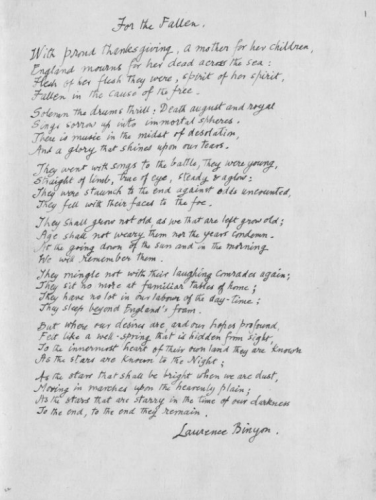When you watch the footage from this new film, based on old footage, you should ponder if adding color and voices give it more impact as an educational tool:
All school children in the UK now are expected to watch it. The title comes from Binyon’s 21 September 1914 poem “For the Fallen”
They shall grow not old, as we that are left grow old:
Age shall not weary them, nor the years condemn.
At the going down of the sun and in the morning
We will remember them.
His words were meant to capture the tone after an August 1914 outbreak of war, where the German Army invaded Luxembourg and Belgium on the “Western Front”. British commitments to uphold Belgian neutrality (as well as Anglo-French naval agreement of 1912) led it to declare war in response and send forces into France.
Some have pointed out England’s response was very unlike their entry into Napoleonic wars where England delayed until 1803 coming to the aid of other nations. However, this provocative thinking is ignorant of history, as Britain faced a very different geo-political situation with the German invasion. Napoleon initially presented the opposite scenario, as his seizure of power within France came with an offering to stabilize and end hostility, given the “1801 Peace of Amiens“.
The treaty was welcomed with such enthusiasm by the British public that on returning to London with Bonaparte’s ratification of the preliminaries the First Consul’s ADC, Lauriston, was welcomed by a huge crowd that unhitched the horses and pulled his carriage through the streets shouting ‘Vive Bonaparte!’. […] “In less than two and a half years that is from 18 Brumaire (9 November, 1799) to 25 March, 1802, the date of the Peace of Amiens, France passed from the debasement into which the Directory had plunged her, to the foremost rank in Europe.”
That moment of celebration and hope for peaceful trade definitely was not the situation a year later, when Britain suddenly realized in 1803 they faced complete loss of economic control (Napoleon stated England deserved no voice in global affairs). Germany in 1914, like France in 1803, was threatening Britain’s empire. Delay didn’t seem to be a real option in 1914, given early attempts at German defeat (no matter how unlikely) could avoid another protracted decade-long Napoleonic war situation (1803–1815).
The 1914 German attack threatened stability and safety across Europe and beyond as it violently pushed all the way into France reaching the eastern Paris outskirts. From September 6th to the 10th, six French armies and the British Expeditionary Force (BEF) counter-attacked along the Marne River and defeated the German Army, forcing retreat northwest.
On 9 September Bülow learned that the British Expeditionary Force (BEF) was advancing into the gap between his 2nd Army and Kluck. He ordered a retreat, obliging Kluck to do the same. The counterattack of the French 5th and 6th Armies and the BEF developed into the First Battle of the Marne, a general counter-attack by the French Army. By 11 September the Germans were in full retreat.
This remarkable change in fortunes was caused partially by the exhaustion of many of the German forces: some had marched more than 240km (150 miles), fighting frequently. The German advance was also hampered by demolished bridges and railways, constricting their supply lines, and they had underestimated the resilience of the French.
France suffered approximately 250,000 casualties in this battle as German forces desperately tried to take Paris. Germany refused to acknowledge their losses. And BEF casualties were recorded as 12,733. Perhaps most significantly, BEF losses signaled the significance of an allied front against German aggression. Some still debate had the BEF and French armies gone further, whether they could have ended German campaigns early and entirely.
A battle in September 1914 thus is considered one of the most important in WWI history, as German retreat at Paris destroyed the “Schlieffen Plan”; quick victory in the West was meant to allow focus on attacking Russia. Instead, Germany was forced to dig in for a protracted war on two fronts. Despite being able to regroup after this battle, ultimately German defeat four years later meant nearly 3 million of its own people killed.
“They Shall Not Grow Old”, named after a September 1914 poem, commemorates in new ways how the British decided to act early and decisively in response to German aggression, saving France and Russia from occupation.
An original written copy of “For the Fallen” has been digitized by the British Library.

Now, as you just read it, did you ponder whether adding color would help? Is that ink black or blue? What is the true shade of the paper?